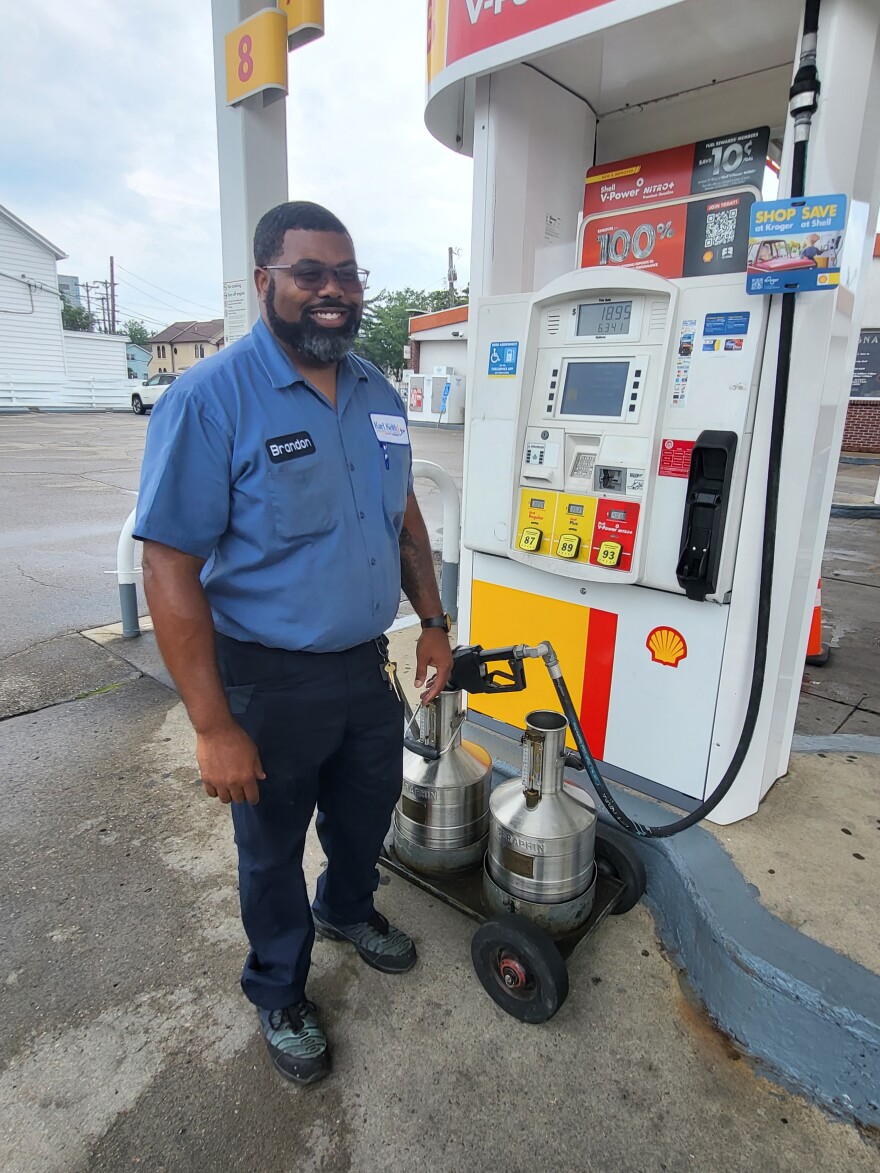Everyday People is a new WYSO series that takes a look at the jobs you might not know much about. But the people who do them protect us and often are the glue holding our communities together.
First up in our series is the Weights and Measures team with the Montgomery County Auditor’s office. You’ve probably never seen a member of this five person team, but the work they do ensures that the public is treated fairly — whether that’s at the gas pump, the grocery store, or the county fair.
A single father finds a new career
I have a confession to make. Before I started working on this series, I had absolutely no idea that there even was a Weights and Measures Department, much less what they did. Sure, I’d seen those little certification stickers from the auditor’s office on the gas pumps, but I never really gave it any thought.
Brandon Ladson was a single father with a 6-year-old daughter working third shift when he went to a job fair a year ago looking for a better paying job that offered more of a work life balance so that he could raise his daughter.
He is now part of the team that inspects and certifies everything from the scales used to weigh produce and bulk foods, to price checking items on shelves, and making sure that the amount of gas going into our tanks matches the readout on the pump.
Ladson said that at his “old job I was stressed out. This job I’m not stressed out. I come to work smiling everyday.” One of his favorite parts of the job is all the different places that they go. “I did not realize Montgomery County was so big until I got this job,” he said laughing.

Protecting consumers from inaccurate measurements
At a Shell station near the University of Dayton, Brandon goes through the process of checking and certifying the pumps with Joe Harris, the Chief Inspector for Weights and Measures in Montgomery County. They use metal containers called provers.
“And this is what we use to test and measure the gas,” Harris said. “Everything that we check and certify needs to be within plus six or minus six in order to pass.”
The duo meticulously fill up each prover with exactly five gallons of fuel from each nozzle on the pump, one at a time. Then the containers of gas are rolled back across the parking lot and poured back into the stations holding tanks.
Ladson also opens each of the gas pumps to check for illegal credit card skimmers. The Weights and Measures team worked with the FBI five years ago in a major crackdown on illegal skimmers.
“I follow the wires around and make sure they are connected to the motherboard,” Ladson said as he looked inside the pump casing.

Then he checked the base inside the pump to make sure that there is no water leaking into the tanks.
“I’m making sure the ground is not full of water. See this is full of rocks,” he said. “There are some where it will be full of water — so they need to get that cleaned out. If you see cobwebs it’s great because it means it’s dry down there.”
In this summer heat you can see the gas vapors rising up from the provers. Everything the team wears has to be 100% cotton. Harris said “the reason for that is when we are dealing with these vapors and fumes like that, anything other than cotton could catch on fire. At least once a week someone will come over, with a cigarette lit, and say ‘Whatcha guys doing?'"
Another thing they check at the gas station are the propane tanks for sale to make sure that the weight in the tank matches what's on the label.
"Just basically anything that is sold by weight, measure or count we go out and make sure that it’s accurate,” Harris said.
Next we head to a dollar store around the corner to price check items on the shelves. The bigger the store the more items they check. At a big box store they would check around 200 items. Ladson gets a price scanner from the store and heads down the aisles scanning prices of random items as he walks up and down the aisles.
We also stop by the cafeteria at Sinclair University, where Ladson checks the scales at the registers using a set of weights to make sure that the readout is showing the correct amount.

“The main thing for us in weights and measures is we’re all about fair equity in the marketplace,” Harris says looking on. “If this scale was to be over and cheating the customer he would shut it down. If that scale was cheating the retailer he would shut it down as well. So, that is one of the things we sometimes have to remind even some of the retailers — we’re here for you as well, it's not just for the customer. And then we get to tell them one other thing. It’s free.”
After the scale passes inspection, Ladson peels off the old sticker for the past year and puts a new certification sticker on. Harris reminds him jokingly to make sure the sticker is straight.
“Why’s it important that it’s straight, Brandon,” Harris said.
“We don’t want a crooked auditor,” Ladson replied.
“We don’t want people to say we have a crooked auditor out here,” Harris agrees laughing.
If you know someone who deserves recognition for a job we might take for granted, send me an email at rwilde@wyso.org.


